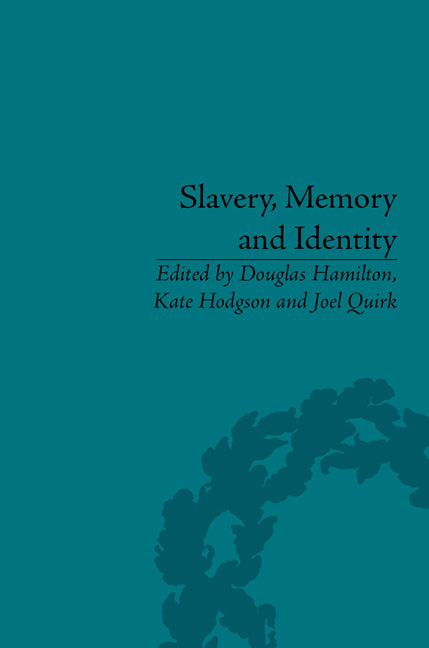Book contents
- Frontmatter
- CONTENTS
- Acknowledgements
- List of Contributors
- Introduction: Slavery, Memory and Identity: National Representations and Global Legacies
- 1 ‘A Thoroughly National Work’: The Politics of Blame and European Abolitionist Identities
- 2 From Slave Quarters to Wigwams: Native American Slaveholding and the Debate over Civilization
- 3 For Civilization's Sake: Legal Abolition of Slavery in Nepal and Sierra Leone in a Global Perspective, 1920–30
- 4 The Heritage of Slavery and Nation Building: A Comparison of South Africa and Mauritius
- 5 Picturing Slavery: The Perils and Promise of Representations of Slavery in the United States, the Bahamas and England
- 6 ‘History Must be Re-Written!’: Revisionist Ambitions among West African Slave Descendants
- 7 Contrapuntal Memories of Slavery and Abolition in the French-Speaking World
- 8 Public Memory of Slavery in Brazil
- 9 Learning to Remember and Imagine Slavery: The Pedagogies of Museum Field Trips in the Representation of ‘Difficult’ Histories
- 10 Slavery and Racism as the ‘Wrongs’ of (European) History: Reflections from a Study on Portuguese Textbooks
- Notes
- Index
6 - ‘History Must be Re-Written!’: Revisionist Ambitions among West African Slave Descendants
- Frontmatter
- CONTENTS
- Acknowledgements
- List of Contributors
- Introduction: Slavery, Memory and Identity: National Representations and Global Legacies
- 1 ‘A Thoroughly National Work’: The Politics of Blame and European Abolitionist Identities
- 2 From Slave Quarters to Wigwams: Native American Slaveholding and the Debate over Civilization
- 3 For Civilization's Sake: Legal Abolition of Slavery in Nepal and Sierra Leone in a Global Perspective, 1920–30
- 4 The Heritage of Slavery and Nation Building: A Comparison of South Africa and Mauritius
- 5 Picturing Slavery: The Perils and Promise of Representations of Slavery in the United States, the Bahamas and England
- 6 ‘History Must be Re-Written!’: Revisionist Ambitions among West African Slave Descendants
- 7 Contrapuntal Memories of Slavery and Abolition in the French-Speaking World
- 8 Public Memory of Slavery in Brazil
- 9 Learning to Remember and Imagine Slavery: The Pedagogies of Museum Field Trips in the Representation of ‘Difficult’ Histories
- 10 Slavery and Racism as the ‘Wrongs’ of (European) History: Reflections from a Study on Portuguese Textbooks
- Notes
- Index
Summary
This chapter addresses the silence that characterizes African domestic slavery in West Africa. Whereas the transatlantic slave trade is remembered and commemorated, domestic slavery has long remained a taboo topic. This chapter sheds light on recent attempts by African people of slave origin to reconsider the contribution of slaves to the construction of African former kingdoms and contemporary nation states. This implies a revision of both popular and official accounts of African history in relation to slavery.
Slavery related to the African continent has several faces: the transatlantic Trade; the trans-Saharan slave trade and Mediterranean slavery; the Indian Ocean slave trade; East African slavery and its Arabian connections; and various forms of domestic slavery inside the African continent. Some are remembered and voiced, others are disregarded and silenced. In 1993, the General Conference of UNESCO approved the Slave Route project proposed by Haiti, Benin and other African countries. This project intended to re-examine the reasons for the historical silence in which the slave trade had for so long been swathed, to establish the historical truth concerning a wilfully masked tragedy and to illuminate the intercultural dialogues born of this trade. In 1994, UNESCO launched the Slave Route project in Ouidah (Benin), underlining the sufferings of the victims of the transatlantic slave trade. The Slave Route project visualizes and materializes the past of the transatlantic slave trade in the form of sites, landscapes, museums and art exhibitions related to the slave trade between Europe, Africa, the Americas and the West Indies. Each year many descendants of slaves from the Americas and Europe visit Ouidah (Benin), Gorée Island (Senegal), Cape Coast (Ghana) and other commemorative sites along coastal West Africa where trained local tour guides teach them about the heritage of the transatlantic slave trade. Tourists hear a lot about the trade in slaves towards other continents, maybe a little about the involvement of African kingdoms in providing slaves for the trade, but hardly anything about how lavery used to be practised in Africa before the arrival of Western traders and how this still affects the contemporary livelihoods of millions of people.
- Type
- Chapter
- Information
- Slavery, Memory and IdentityNational Representations and Global Legacies, pp. 91 - 104Publisher: Pickering & ChattoFirst published in: 2014



